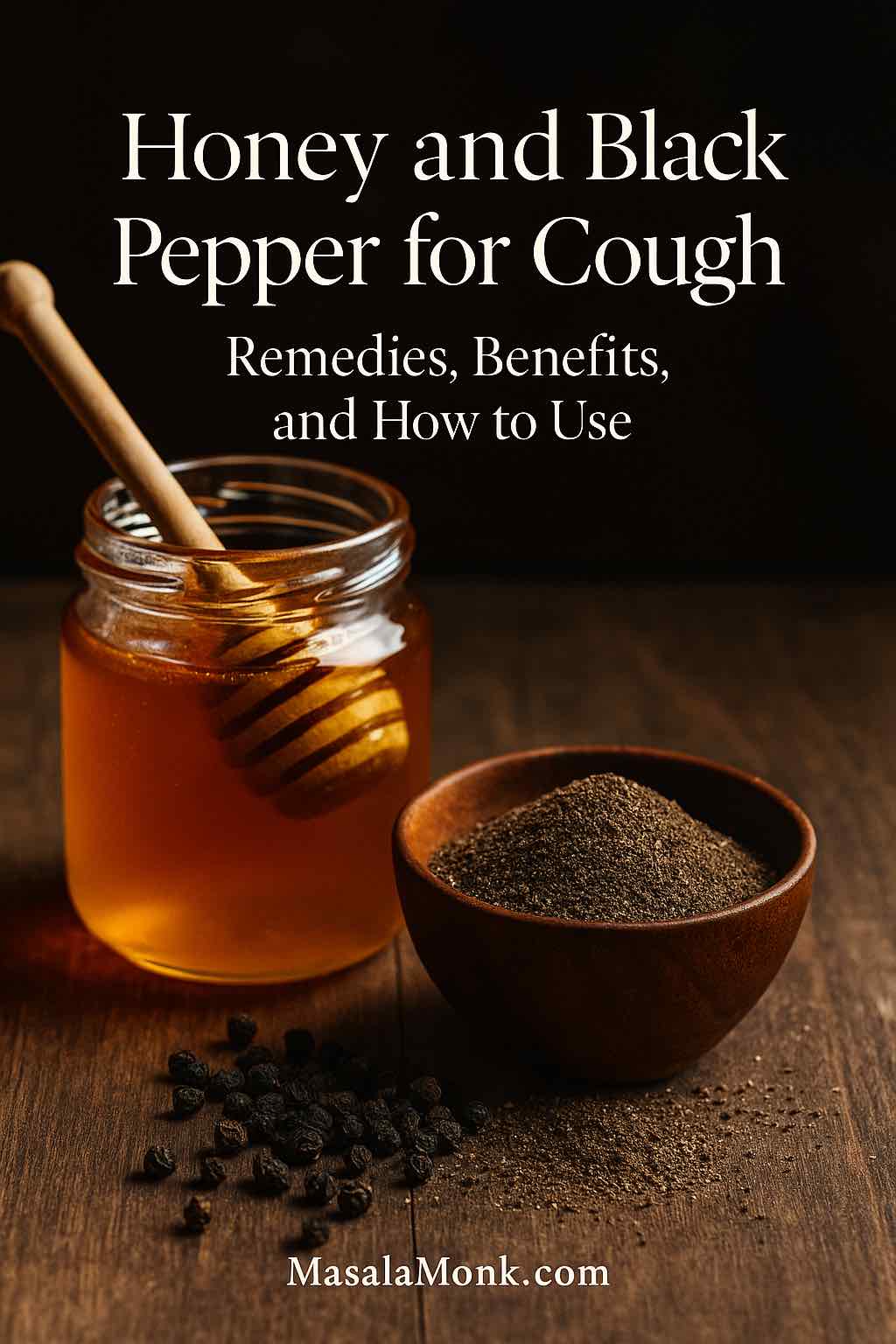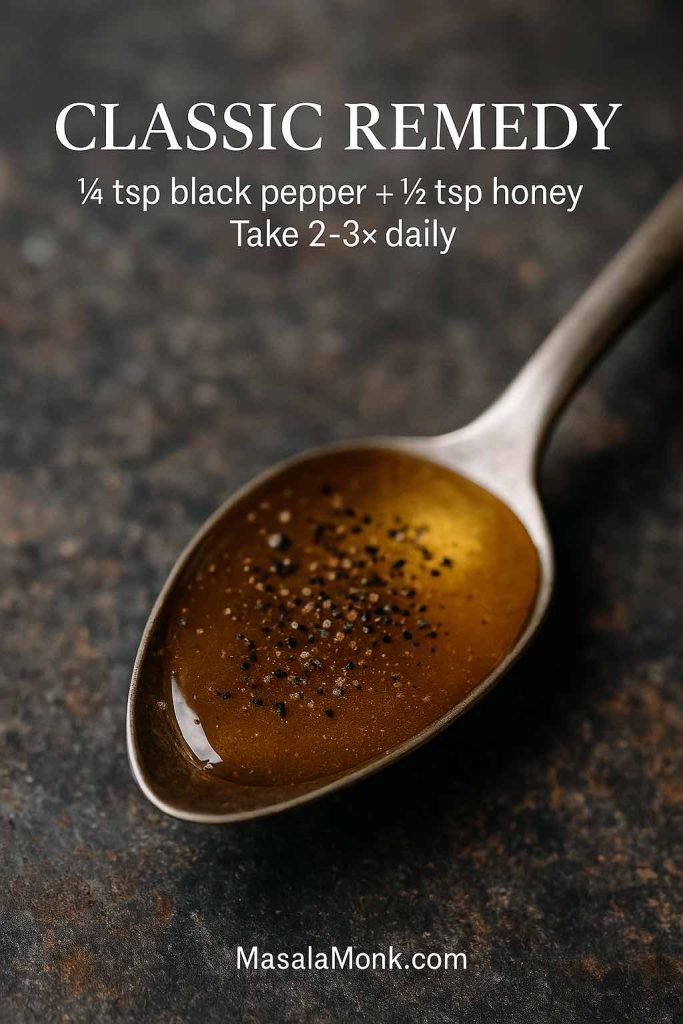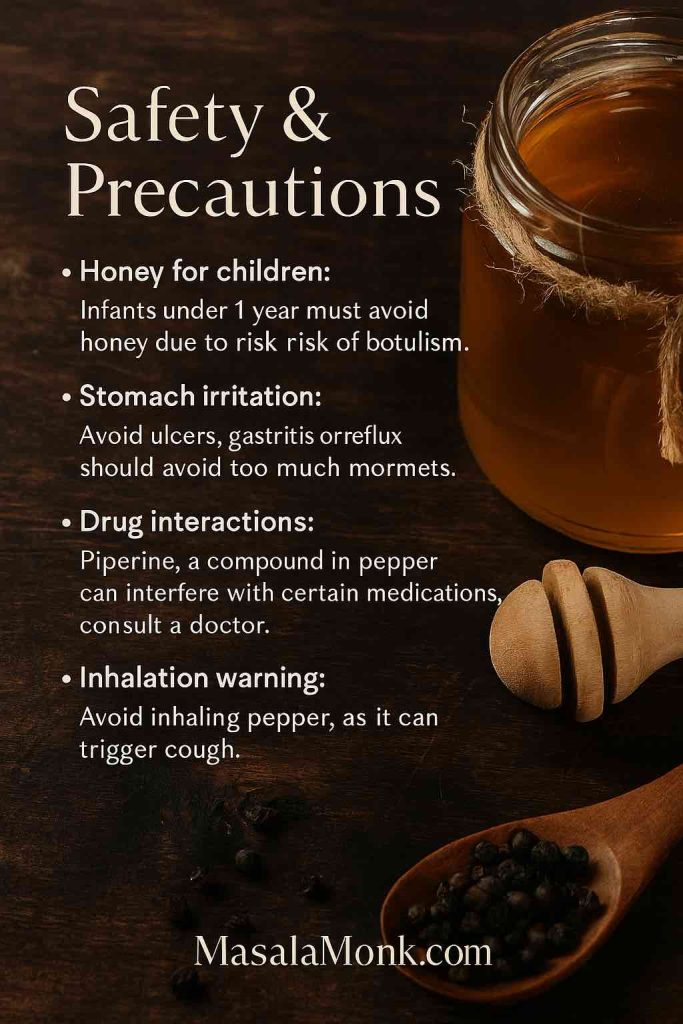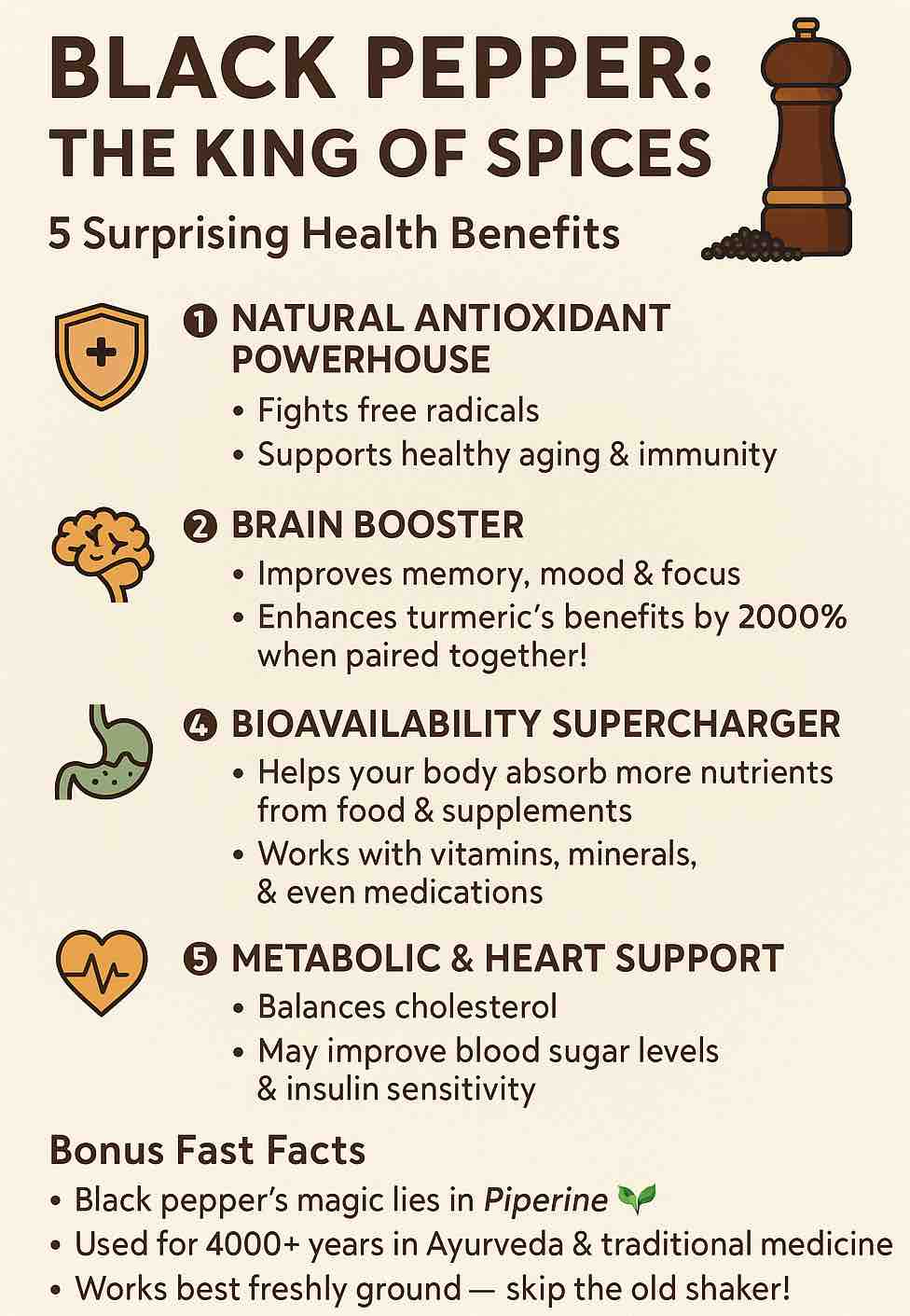
When a cough lingers, keeping you awake at night or making your throat feel raw, many people instinctively turn not to over-the-counter syrups but to something far simpler — the kitchen spice jar and honey pot. Among the oldest and most trusted remedies is honey mixed with black pepper.
Honey is naturally soothing, coating the throat and calming irritation. Black pepper, on the other hand, adds gentle warmth and has been valued for centuries in Ayurveda and other traditional systems as a way to clear mucus and boost circulation. Together, they make a remedy that is both comforting and intriguing: one part sweet, one part sharp, and entirely natural.
Modern science has started to validate at least half of this duo. A 2021 meta-analysis in BMJ Evidence-Based Medicine found that honey outperformed standard care in reducing cough frequency and severity in people with upper respiratory tract infections (PubMed). Another systematic review in children confirmed that honey helps kids over 1 year sleep better and cough less (PMC). For black pepper, the evidence is still developing — but centuries of traditional use give it credibility worth exploring.
For even more ideas, check out our roundup of 14 effective home remedies for cough.
Disclaimer: This article shares traditional and home-based remedies for cough. They are meant for general wellness support and not as a substitute for professional medical advice. If your symptoms persist or worsen, please consult a qualified healthcare provider.
Why Black Pepper Has Been Used for Cough
Black pepper (Piper nigrum), known in Ayurveda as Maricha, is not only a culinary spice but also a medicinal one. In classical Ayurvedic texts, it is considered part of Trikatu (alongside ginger and long pepper), a formula used to kindle digestion, reduce phlegm (Kapha), and support the respiratory system. Another preparation, Talisadi Churna, includes black pepper as a core ingredient and is still prescribed for chronic cough and bronchitis in Ayurvedic practice.
From a scientific perspective, black pepper’s active compound, piperine, has drawn attention for its anti-inflammatory, antioxidant, and expectorant-like properties. These properties may explain why pepper is so often included in remedies for colds and coughs. However, unlike honey, there are fewer modern clinical trials directly testing black pepper for respiratory symptoms. What we do know is that traditional healers weren’t imagining its effects — pepper’s sharp pungency really does stimulate the airways and circulation.
Explore more science and research backed remedies in DIY Natural Cough Syrups and Home Remedies (Dry & Wet Cough Relief).
The Honey and Black Pepper Combination
So what happens when we bring these two together? Honey provides the soothing, cough-suppressing action; black pepper adds warmth and helps loosen phlegm.
Anecdotal reports and traditional recipes consistently recommend this pairing, and while direct clinical evidence is scarce, the logic makes sense: the sweet balances the sharp, the soothing balances the stimulating. Even without a large body of randomized trials, it remains one of the most popular and accessible home remedies for cough.

How to Try the Classic Remedy
- Mix ¼ teaspoon finely ground black pepper with ½ teaspoon raw honey.
- Take slowly, letting it coat the throat.
- Repeat up to 2–3 times a day when symptoms are bothersome.
This blend works best for dry or tickly coughs, but some people also use it for chesty coughs to help clear mucus.
Honey and Black Pepper with Other Natural Remedies
Of course, few remedies exist in isolation. Across India and beyond, families have passed down their own variations — often adding other common kitchen healers. Here are some of the most beloved, each with its own rationale and charm.
1. Honey, Ginger, and Black Pepper for Cough
When your cough is chesty or phlegmy, ginger is your best friend. It’s naturally anti-inflammatory and can help clear the airways. Adding honey and black pepper makes this remedy both soothing and stimulating.
How to make it:
- Boil 1 cup of water with ½ teaspoon of grated fresh ginger.
- Add ¼ teaspoon black pepper powder.
- Simmer for 2–3 minutes, then strain.
- Stir in 1 teaspoon honey once the tea cools slightly.
Sip this warm, spicy tea twice a day to loosen mucus and ease coughing.
Read more about Ginger And Its Stunning Health Benefits.
2. Honey, Turmeric, and Black Pepper “Golden Milk”
Turmeric is a classic healing spice, and when combined with black pepper, its active compound curcumin is absorbed much better. Honey rounds out the mix with a naturally sweet, throat-soothing touch.
How to make it:
- Warm 1 cup milk (dairy or plant-based).
- Add ½ teaspoon turmeric powder and a pinch of black pepper.
- Stir well, then let it cool slightly.
- Add 1 teaspoon honey before drinking.
Best taken before bed for a calming night-time cough remedy.
Read more about Side Effects of Turmeric – 10 Risks of Powder, Tea & Supplements.
3. Honey, Lemon, and Black Pepper Drink
Lemon adds a burst of vitamin C and a refreshing tang, making this remedy especially nice for daytime use.
How to make it:
- Warm 1 cup of water.
- Add juice of half a lemon, ¼ teaspoon black pepper, and 1 teaspoon honey.
- Stir well and sip slowly.
This drink helps soothe a sore throat while also boosting hydration.
Learn more about Benefits of Lemon and Lime Water: Refreshing Hydration with a Citrus Twist.
4. Honey, Tulsi (Holy Basil), and Black Pepper
Tulsi, or holy basil, is a cornerstone of Ayurvedic medicine for cough and cold. Paired with black pepper and honey, it becomes a gentle yet effective home remedy.
How to make it:
- Boil 5–6 fresh tulsi leaves in 1 cup water for 5 minutes.
- Add ¼ teaspoon crushed black pepper.
- Strain and let it cool slightly.
- Sweeten with 1 teaspoon honey.
Perfect for stubborn coughs with congestion.
Explore 5 Herbal Teas & Brews That Help Lower Cortisol Naturally.
5. Honey, Garlic, and Black Pepper Paste
This one might sound strong, but garlic has natural antimicrobial properties that make it a powerful ally during cough and cold.
How to make it:
- Crush 1 small garlic clove into a paste.
- Mix with ¼ teaspoon black pepper powder.
- Blend in 1 teaspoon honey to soften the flavor.
Take it once daily for a short burst of immune support.
You can also explore fermented garlic honey, another age-old immunity booster with a similar base.
🍯 Honey & Black Pepper Remedies at a Glance
| Remedy | Ingredients | How to Make | Best Time to Take |
|---|---|---|---|
| Classic Honey + Black Pepper | ¼ tsp black pepper + ½ tsp raw honey | Mix and take slowly, 2–3 times/day | Anytime during cough flare-ups |
| Ginger, Honey & Pepper Tea | 1 cup water, ½ tsp grated ginger, ¼ tsp pepper, 1 tsp honey | Boil ginger + pepper, strain, add honey | Morning & evening for chesty/phlegmy cough |
| Turmeric Golden Milk | 1 cup milk, ½ tsp turmeric, pinch of pepper, 1 tsp honey | Warm milk with turmeric + pepper, add honey after cooling slightly | Before bed, for night-time cough |
| Lemon, Honey & Pepper Drink | 1 cup warm water, juice of ½ lemon, ¼ tsp pepper, 1 tsp honey | Mix all ingredients and sip slowly | Daytime, for sore throat + hydration |
| Tulsi (Holy Basil) Tea | 1 cup water, 5–6 tulsi leaves, ¼ tsp pepper, 1 tsp honey | Boil tulsi + pepper, strain, add honey | During congestion or stubborn cough |
| Garlic, Honey & Pepper Paste | 1 small garlic clove, ¼ tsp pepper, 1 tsp honey | Crush garlic, mix with pepper + honey | Once daily in the morning, for immune boost |
Pro Tips:
- Always let hot liquids cool a little before adding honey — high heat can reduce its natural benefits.
- Start with smaller amounts of pepper if you’re not used to its sharpness.
- Raw, unprocessed honey works best for soothing cough.
Some families even swap honey for mishri (rock sugar), pairing it with pepper to soothe cough naturally.
Black Pepper Remedies Without Honey
Not everyone wants to use honey — whether for dietary reasons, personal preference. Fortunately, pepper can be used in other ways.
1. Pepper Rasam for Cold and Cough
If you’ve ever had South Indian rasam, you’ll know how comforting and clearing it feels. This light, peppery broth is often used as a natural cold and cough soother.
How to make it:
- In a small pot, boil 2 cups water with a marble-sized ball of tamarind (or 1 tsp paste).
- Add 1 teaspoon coarsely crushed black pepper and ½ teaspoon cumin seeds.
- Throw in a few curry leaves and a clove of garlic (optional).
- Simmer for 10 minutes, then season with salt.
Sip hot like a soup — it warms the chest, eases congestion, and clears nasal passages.
This tangy soup does more than warm you up — it’s one of India’s most loved natural remedies to ease mucus and congestion. If you want to explore more traditional and home based remedies that might help with mucus, do read Is Thick Mucus Troubling You? 7 Foods and Home Remedies to break down Excess Mucus.
2. Black Pepper Gargle for Sore Throat
Sometimes a quick gargle is all you need to calm a raw throat. Adding a pinch of pepper to warm salt water gives an extra circulation boost.
How to make it:
- Mix ½ teaspoon salt and ¼ teaspoon crushed black pepper in 1 cup warm water.
- Gargle for 20–30 seconds, then spit it out.
- Repeat twice a day during sore-throat flare-ups.
This helps reduce irritation and may speed up recovery.
3. Chewing Black Pepper for Cough — Does It Work?
Some traditions recommend chewing a few whole peppercorns for dry cough. While the heat may trigger more coughing at first, the warming oils can stimulate saliva and soothe throat tickle afterwards.
How to try it:
- Take 1–2 whole peppercorns and chew slowly.
- Allow the juices to mix with saliva before swallowing.
👉 Not everyone finds this comfortable, so start small and avoid if it irritates your throat.
🌿 Black Pepper Remedies Without Honey
| Remedy | Ingredients | How to Make | When to Use |
|---|---|---|---|
| Pepper Rasam | 2 cups water, tamarind (or 1 tsp paste), 1 tsp crushed pepper, ½ tsp cumin, curry leaves, garlic (optional), salt | Boil everything 10 min, season, sip hot like soup | During colds or chest congestion; as a light meal |
| Pepper Gargle | 1 cup warm water, ½ tsp salt, ¼ tsp crushed pepper | Mix and gargle for 20–30 sec, then spit out | 2× daily for sore throat relief |
| Chewing Peppercorns | 1–2 whole peppercorns | Chew slowly, let oils release before swallowing | For quick relief of tickly, dry cough (try cautiously) |
Pro Tips:
- Rasam is light and hydrating — perfect if you don’t feel like eating much when sick.
- Skip pepper gargle if your throat is extremely raw or ulcerated.
- Chewing peppercorns can feel intense — sip warm water afterward if it’s too strong.
Safety, Interactions, and Precautions
While honey and black pepper are safe in culinary amounts, there are a few things to keep in mind:
- Honey for children: Safe only for kids over 1 year. Infants must not be given honey due to the risk of botulism (PMC).
- Stomach irritation: If you have ulcers, gastritis, or reflux, too much pepper may worsen symptoms.
- Drug interactions: Piperine, the compound in pepper, can interfere with how the body metabolizes certain medicines. Research shows it inhibits enzymes like CYP3A4 and P-glycoprotein, potentially changing how drugs are absorbed (PMC, JPET abstract). If you are on long-term medication, check with your doctor before taking pepper remedies regularly.
- Inhalation warning: Pepper is best ingested, not inhaled. Studies show that airway exposure to compounds like capsaicin — a TRPV1 agonist similar in pungency to pepper — actually provokes cough, not relieves it (Pharmaceutical Journal).

When to see a doctor
While home remedies are helpful for mild coughs and colds, don’t ignore warning signs. Seek medical advice if you have:
- A cough lasting longer than 3 weeks
- High fever, chest pain, or shortness of breath
- Blood in phlegm or worsening symptoms
- Severe sore throat with difficulty swallowing
Note: While honey and black pepper are safe for most people in small amounts, they are not a cure-all. Everyone’s body reacts differently, and medical conditions or medications may change how safe these remedies are for you. Always check with your doctor if you are pregnant, nursing, giving remedies to children, or on regular medication.
Traditional Uses of Black Pepper for Cough
Ayurveda
In Ayurveda, black pepper is called Maricha and is one of the famous Trikatu herbs (along with dry ginger and long pepper). It’s traditionally used to balance excess Kapha, the dosha linked with phlegm, colds, and cough. Classic Ayurvedic formulations such as Talisadi Churna and Trikatu Churna include black pepper and are prescribed for Kāsa (cough) and Śvāsa (breathlessness/asthma). A common household remedy is simply Maricha powder mixed with honey, taken to soothe dry cough.
Unani
In the Unani system, black pepper (known as Filfil Siyāh) is considered an expectorant and warming spice. It is traditionally given with honey to clear mucus, relieve throat irritation, and ease breathing difficulties. Honey and pepper together are still widely used in Unani-inspired home remedies for cough and cold.
Traditional Chinese Medicine (TCM)
In TCM, black pepper is called Hú Jiāo. It is classified as hot and acrid, and its role is to “warm the middle” and help disperse cold. While it’s not a frontline herb for cough (compared to others like zi wan or bai bu), it can be included in formulas when cough is linked with cold and phlegm. It’s usually combined with other herbs, not used alone.
For a wider view of how Indian kitchens blend tradition with wellness, see our piece on the holistic health benefits of Indian cuisine.
Bringing It All Together
What makes honey and black pepper such a beloved remedy isn’t just the science — though honey in particular has solid clinical support. It’s the combination of tradition, taste, and accessibility. Ayurveda, Unani, and folk medicine all recognize black pepper’s value for cough, and now modern pharmacology is revealing its active compound piperine’s many effects.
For honey, the evidence is clear: meta-analyses and systematic reviews confirm its role in easing cough and improving sleep. For pepper, much of the knowledge comes from tradition, supported by emerging mechanistic studies and safety reviews. Together, they make a duo that bridges old wisdom and new science.
The next time you feel a cough tickling your throat, try reaching for what you already have in your kitchen. A spoonful of honey, a pinch of black pepper, and a little patience might bring just the relief you need.
Friendly reminder: Home remedies like honey and black pepper can soothe mild coughs, but they are not a replacement for medical care. If you have a cough that lingers more than three weeks, comes with high fever, chest pain, or blood in phlegm, please seek medical attention promptly.
❓ Frequently Asked Questions
1. Is honey and black pepper really good for cough?
Yes — honey has solid scientific backing for cough relief, and black pepper adds gentle warmth that can help loosen mucus. Together, they make a soothing, time-tested home remedy for mild coughs.
2. How often can I take honey and black pepper for cough?
You can safely take the mix 2–3 times a day in small amounts. A common recipe is ¼ teaspoon ground black pepper mixed with ½ teaspoon raw honey. Always listen to your body and avoid overdoing it.
3. Can I give honey and black pepper to my child?
Honey is safe only for children over 1 year old. For little ones above that age, you can try small amounts, but always start gently since pepper can feel spicy for kids. Never give honey to infants under 1 year.
4. Does black pepper cure cough completely?
No single remedy can guarantee a complete cure, especially if the cough is caused by infection, allergies, or asthma. Black pepper helps manage mild coughs and throat irritation, but if symptoms persist, consult a doctor.
5. Can I use whole peppercorns instead of ground pepper?
Yes, but chewing whole peppercorns can feel quite intense. Ground pepper mixed with honey is gentler and coats the throat more effectively. If you do try peppercorns, start with just one.
6. What’s the best time to take honey and black pepper for cough?
Evenings are great because honey soothes the throat and helps with sleep. But you can also take it in the morning or afternoon if your cough feels bothersome then. There’s no strict rule — go with what feels best.
7. Can pregnant women use honey and black pepper for cough?
Yes, in normal culinary amounts it’s usually safe. However, during pregnancy it’s always wise to check with your doctor before trying home remedies, especially if you have heartburn or are taking medications.
Curious about using pepper during pregnancy? We’ve covered 6 benefits of black pepper for pregnancy, along with key safety tips.
8. Are there any side effects of black pepper and honey?
In moderation, they’re safe for most people. But too much pepper may irritate the stomach or throat. And since pepper’s active compound, piperine, can affect how your body absorbs certain drugs, talk to your doctor if you take daily medication.
9. Does honey and black pepper help with sore throat as well?
Absolutely. Honey coats the throat and eases irritation, while pepper adds circulation-boosting warmth. Many people use this combo for both cough and sore throat.
10. What if my cough doesn’t improve with honey and black pepper?
If your cough lasts more than three weeks, or you notice red flags like fever, chest pain, wheezing, or blood in phlegm, seek medical help. Home remedies are supportive, but they’re not a replacement for professional care when symptoms are severe.











